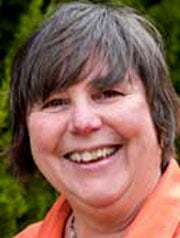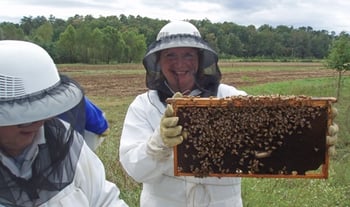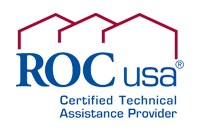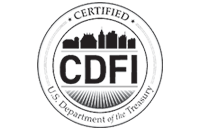
Guest blog: How beekeeping helped me become a better leader
By Charlene Andersen
Leadership coach Renee Charney shares lessons she learned from beekeepers.
I've always been a fan of biomimicry and the inventions created from observing nature. Renee Charney's latest blog post was so good I thought you all would be interested to read her observations of beekeeping and what leaders can learn from it.
Take a read and give some thought to her questions. How do you lead like a beekeeper?
Honeybees fascinate me.
I recently crossed off one of my “bucket list” items and spent time at the Heifer Ranch in Arkansas learning about beekeeping. Everything I knew about bees and beekeeping up to now came strictly from books or documentaries. No hands-on experience. So I heeded the nagging nudge and gave it a try.
Suffice it to say, I’m hooked.
 Sue Hubbell tells us in her book, A Book of Bees: And How to Keep Them,“The end of one honey season is the start of the next, and autumn is a good time to start with bees. … Summer’s end is also the new beginning of a new cycle for bees. It is then that they prepare for the winter ahead, and their preparations, along with the help a beekeeper can give them, determine how good the next season will be.”
Sue Hubbell tells us in her book, A Book of Bees: And How to Keep Them,“The end of one honey season is the start of the next, and autumn is a good time to start with bees. … Summer’s end is also the new beginning of a new cycle for bees. It is then that they prepare for the winter ahead, and their preparations, along with the help a beekeeper can give them, determine how good the next season will be.”
I learned a lot that week – how to calm the bees, extract honey, build and repair supers—all good, practical activities. The biggest impact for me, though, was what I learned by observing the master beekeeper, Chuck Crimmins, as he lovingly cared for his bees.
It’s said that bees learn to recognize their beekeeper’s voice and the rhythm of his or her movements. Bees will react, either aggressively or calmly, depending on what is happening around them. Vibrations unnerve them. They can sense apprehension and smell fear.
Watching Chuck’s quiet and gentle movements was like watching a movie clip in slow motion. Bending to rest his ear on the side of the hive, he listens for the buzzing hum. Are the bees active? Quiet? He slowly removes the hive cover, gently pulling out each frame, holding them up to the sunlight to check the bees’ health, and tenderly uses his breath to blow them aside to look for the queen. Bees are landing lightly on his arms, flying around him—he works the bees all the while without wearing gloves! It was inspiring to watch Chuck’s quiet and slow approach how, as beekeeper, his role as helper, he held and cared for the space where the bees calmly work their magic.
Reflecting on Hubbell’s words and spending time with Chuck that week made me think about leadership and how we leaders can often get it wrong. We think our teams need us more than they actually do. We lean into our position, our expert-ness, our thinking that our way is best. We over-care and overbear, fill voids with our voices and opinions, stomp heavily on ideas outside our own—whatever it is, we get in the way of possibility and the creative magic that our teams can create.
Beekeeper-like leadership—this is a notion that I’d like to ponder a bit more. What opportunities do we have to lead our teams like a beekeeper tends to his bees? What are the ways we might lightly step in when needed, gently check in to assess health, and then confidently assume that our teams are competent to learn from mistakes, perform and deliver? As Susan Scott invites us to consider in Fierce Leadership, "... instead of holding them accountable, hold them able!” How significant a shift might that make in the teams we lead?
Honeybees don’t really require our help; they’ve been collecting pollen and making honey for thousands of years. Perhaps the folks we lead have an intuitive sense about how to work in ways that we can only imagine, if only we make way for their intuition to take hold.
What beekeeping behaviors might deepen your capacity to lead? I'm interested in hearing from you.
Renee Charney, President and Founder of Charney Coaching & Consulting LLC, has over 25 years of corporate experience in coaching, learning, leadership, and organizational development and effectiveness. Read more of her blogs.
Charlene Andersen is the Manager of Business Education for the Community Loan Fund's Business Finance team.















